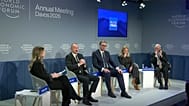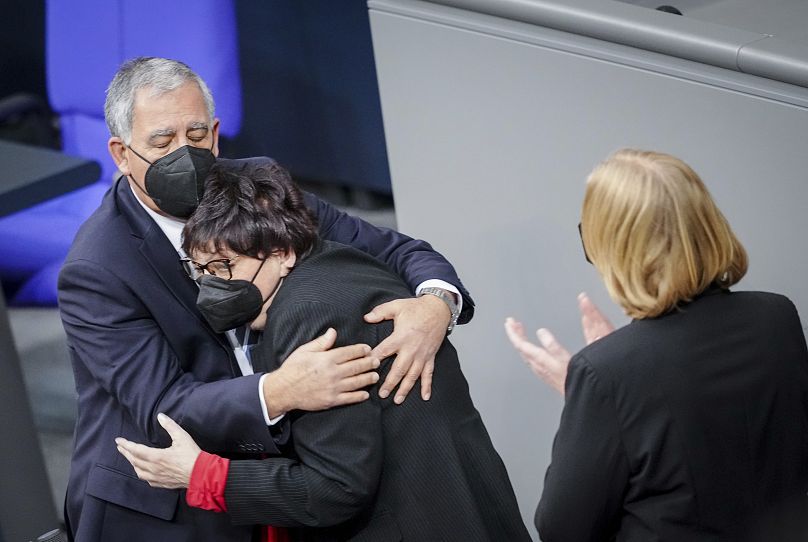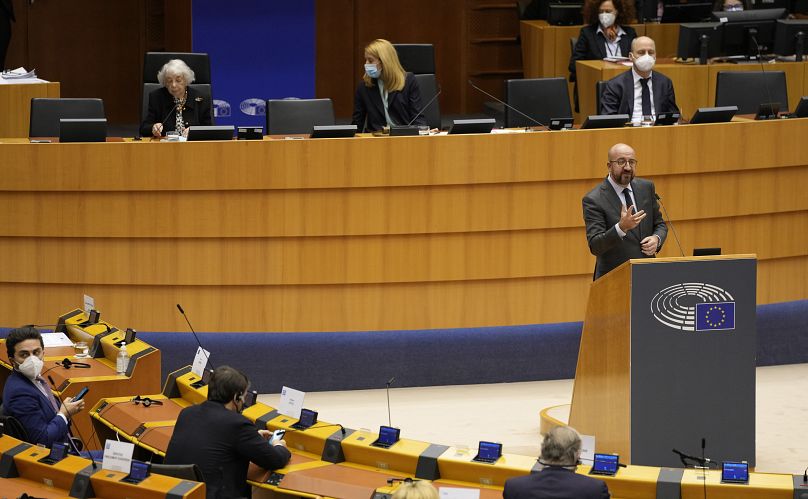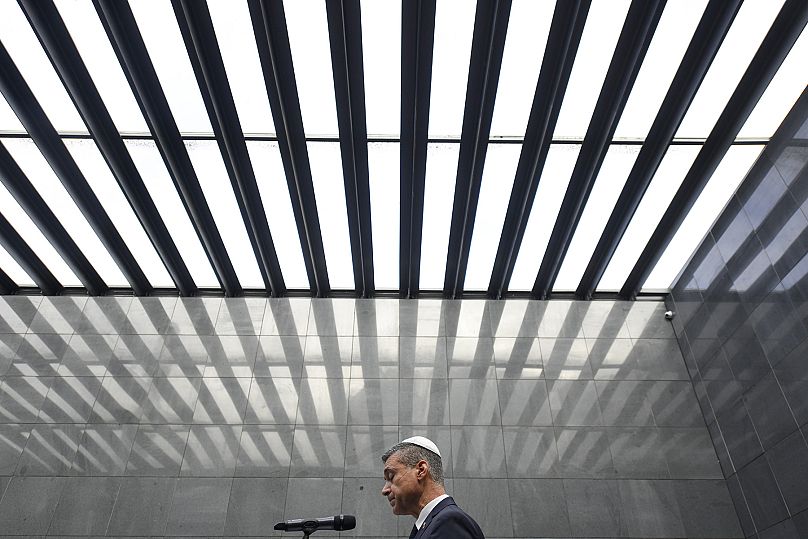January 27 marks the International Day of Holocaust Remembrance, an occasion to commemorate the victims of the Nazi German regime.
The International Day of Holocaust Remembrance commemorations in Europe took place amid a rise of antisemitism that gained traction during lockdowns as the COVID-19 pandemic has exacerbated hatred online.
January 27 marks an occasion to commemorate the victims of the World War II Nazi German regime, and this year they were honoured across the continent, gathering survivors and numerous government representatives paying their respects to the millions who lost their lives.
The Nazis carried out their Final Solution, systematically murdering an estimated six million Jews, and an additional 11 million people — including members of the Roma and Sinti communities and LGBT+ people, and opponents of the regime — during the war.
The date was chosen by the United Nations General Assembly in 2005 as it marks the liberation of Auschwitz-Birkenau, the most notorious of the death camps, liberated by the Red Army in 1945.
At the memorial site in Poland, which was subjected to a brutal German occupation during World War II, a small number of survivors gathered in an auditorium.
Attendance at the yearly event was sharply curtailed amid Europe's coronavirus surge. Others joined online.
Nazi German forces killed 1.1 million people at Auschwitz, and the site today stands as a powerful symbol of how hatred and indifference led to the Holocaust.
Tears at the Bundestag
In Germany, Bundestag speaker Baerbel Bas noted that the pandemic has acted “like an accelerant” to an already burgeoning issue.
“Antisemitism is here — it isn’t just on the extreme fringe, not just among the eternally incorrigible and a few antisemitic trolls on the net,” she said. “It is a problem of our society — all of society.”
In recent days alone, a 12-year-old Jewish boy in Italy was attacked and subjected to antisemitic slurs while two men were attacked in London.
“I have lived in New York for 75 years, but I still remember well the terrible time of horror and hatred,” survivor Inge Auerbacher, 87, told the German parliament.
“Unfortunately, this cancer has reawakened and hatred of Jews is commonplace again in many countries in the world, including Germany.”
“This sickness must be healed as quickly as possible,” Auerbacher said.
“Our country bears a special responsibility — the genocide against the European Jews is a German crime,” Bas said.
Israel’s Knesset speaker, Mickey Levy, broke down in tears at the German parliament commemorative session while reciting the Jewish mourner’s prayer from a prayer book that belonged to a German Jewish boy who celebrated his bar mitzvah on the eve of Kristallnacht, a coordinated series of anti-Jewish attacks across the country in 1938.
Levy said that Israel and Germany experienced “an exceptional journey on the way to reconciliation and establishing relations and brave friendship between us”.
Levy also accompanied German Chancellor Olaf Scholz and President Frank-Walter Steinmeier as they laid wreaths at the Memorial to the Murdered Jews of Europe in Berlin.
In Brussels, EU lawmakers listen to survivors
Gathered at the European Parliament, EU lawmakers listened to 100-year-old Holocaust survivor Margot Friedlander's story.
She was arrested in 1944 while on the run and brought to Theresienstadt, in what is now the Czech Republic. A year before, her mother and brother were deported to Auschwitz, where they were both killed.
Friedlander and her husband emigrated to the US in 1946 and she returned to Berlin in 2010. She has since been traveling around Germany to tell her story and promote remembrance.
“We must be vigilant and not look the other way as we did then," she said. “Hatred, racism and antisemitism must not be the last word in history."
The EU Council president Charles Michel insisted on the importance of commemorating the Shoah as the number of survivors diminishes every year.
“With each passing year, the Shoah inches towards becoming a historical event," Michel said.
“More and more distant, more and more abstract. Especially in the eyes of the younger generations of Europeans. This is why, paradoxically, the more the years go by, the more important the commemoration becomes. The more essential."
All three presidents of the EU institutions also took part in an online event organized by the European Jewish Congress, or EJC.
The European Commission — the EU's executive branch — presented last year a new strategy to tackle hate speech, raise awareness about Jewish life, protect places of worship and ensure that the Holocaust isn't forgotten.
According to Europe's Fundamental Rights Agency, nine out of ten Jews say that antisemitism has increased in their country and is a serious problem.
With the wide circulation of false information about the Holocaust on the internet, EJC President Moshe Kantor cited the coronavirus pandemic as one of the reasons for the rise in antisemitism.
He asked leaders to increase their efforts to connect with European youth to make them more aware of the Holocaust.
"It is no accident that in the midst of the pandemic, extremists are spreading disinformation and conspiracy theories about Jews or the State of Israel", said Kantor.
With France currently holding the rotating presidency of the Council of the European Union, the EJC ceremony focused on the Holocaust in France, on the 80th anniversary of the Vel d'Hiv round-up, a mass arrest of Jews by French police in 1942.
French President Emmanuel Macron said he took action to dissolve groups promoting hatred and deplored that "falsifications of history are back".
'Indifference is the biggest enemy of democracy'
In Italy, members of the Jewish community and lawmakers gathered in Rome’s Ghetto to lay a wreath where more than 1,000 people were rounded up and deported to Auschwitz on 16 October 1943.
Speaker of the Lower Chamber Roberto Fico and Senate Speaker Elisabetta Casellati laid wreaths on the site.
Lello Dell'Ariccia, Member of the Jewish Community of Rome, said that the day was chosen as "a symbol of the Shoah: as the symbol of the liberation, but fundamentally it is symbolic for all those who died in the concentration camps."
"And the 'Memory Day' is the day that has to commemorate, remember and make us think about what happened," Dell'Ariccia stated.
Participants in the commemoration included Italian senator-for-life, Liliana Segre, a 91-year-old Auschwitz-Birkenau survivor who has made educating younger generations about the Holocaust her life’s work.
In the Romanian capital Bucharest, a small ceremony took place inside a Holocaust memorial where the Israeli ambassador to the country gave a speech cautioning that indifference towards persecution can be the undoing of democracy.
"We should not remain indifferent because indifference is the biggest enemy of democracy. We should not let only the voice of extremism be heard," said Ambassador David Saranga.
Auschwitz survivor Fulop Octavian also spoke at the event, sharing his strong commitment that younger generations need to remember the events of the Holocaust, "because without it history can be repeated."
In Albania, Minister for Europe and Foreign Affairs Olta Xhaçka honoured the millions of victims while taking pride in her country's role in sheltering Jews.
"We honour the memory of the millions of innocent Jews killed by the Nazis during WWII. But as Albanians, we also look back with pride at the fact that Jews were welcomed, sheltered and saved from tragedy, earning Albania a place among the Righteous Among Nations," Xhaçka wrote on Twitter.
Although occupied by both Germany and Italy during World War II, Albania was the only country in Nazi-occupied Europe that saw an increase in its Jewish population, due to the Albanian people's pledge not to hand them over. In Berat, a city in central Albania alone, they were concealed in the homes and basements of some 60 families from the Muslim and Christian communities.
You can watch the Auschwitz**commemoration event in the video player above.**


















